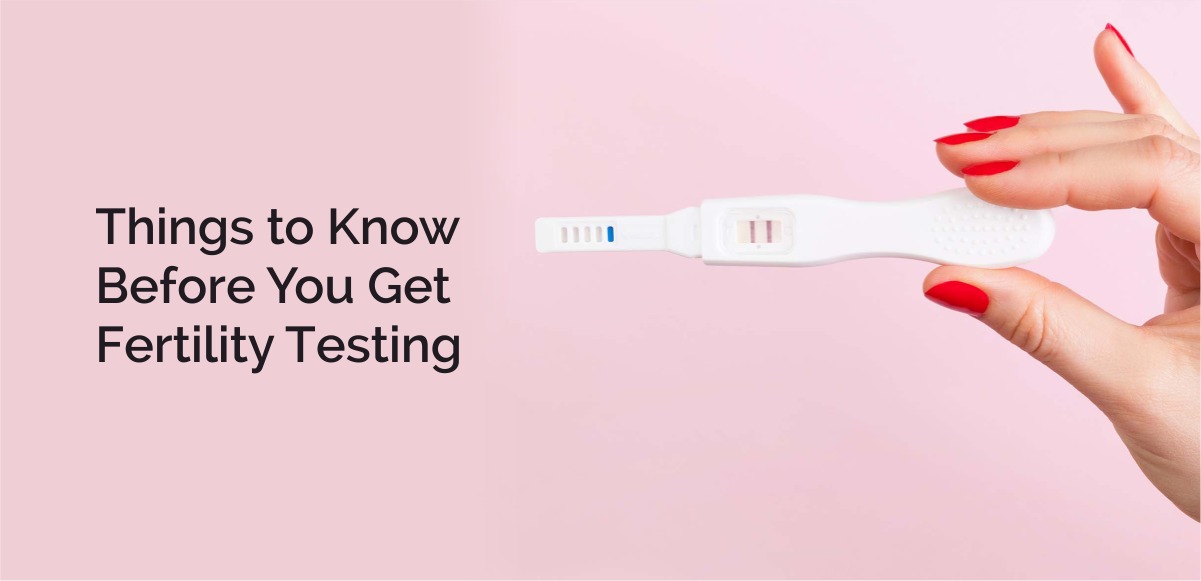

Have you and your partner been trying to conceive for more than a year? Despite regular, unprotected sexual intercourse, are you not able to get pregnant?
If the answer to these questions is a “Yes,” then there is a good chance that one of you may be infertile.
Infertility is prevalent, affecting about 10% - 15% of couples. But the good news is that many treatment options are available to help you get pregnant.
It is best to consult a fertility expert in such cases. They will analyze your condition and advise tests to help you find out the cause of the problem.
However, there are a few things to know before you get fertility testing. Let’s understand them.
What Is Infertility?
Infertility is a condition in which a couple is not able to conceive after a year of regular, unprotected sex. For a woman above 35 years of age, this means not being able to get pregnant after trying for six months.
Here, it is essential to know that infertility is not limited to a woman. Infertility issues prevail equally in men.
Factors that Cause Infertility:
While infertility can affect anyone, certain factors increase your risk. If you have any of the mentioned factors, it is best to consult a doctor or a fertility expert.
Some of these factors include:
For men
- Injury to scrotum or testes
- Ejaculation problems
- Erectile dysfunction
For women
- Being 30 years of age or older, if you haven’t had a child
- Family history of early menopause (at the age of 38 or younger)
- Family history of autoimmune diseases or fragile egg syndrome
- Obesity
- Smoking
Things A Fertility Expert Might Ask You:
Your fertility expert may ask you about your lifestyle and health.
Here are some questions they may ask:
- Medical history of current or past illness
- Medication history
- Habits such as drinking alcohol, smoking, or using illicit drugs
- Frequency of sex
- Contraception use
- History of sexually transmitted disease
- Any problems while having sex
Your doctor may also ask questions related to your periods, like:
- Frequency of your periods
- If you have been pregnant before
- History of missed or irregular periods
- Any changes in blood flow
- If you had spotting between periods
- History of prior infertility treatment, if any
Female Fertility Tests
Some common causes for infertility in women are associated with ovulation, fertilization in the fallopian tubes, and implantation of the fertilized egg on the uterine lining.
Some tests that can help your doctor find out the cause include:
- Ultrasound to examine the uterus and ovaries
- Hysterosalpingography, a type of X-ray to examine the uterus and fallopian tubes
- Laparoscopy to check internal organs
- Ovarian reserve testing to understand your potential for conceiving
Male Fertility Tests:
Common infertility problems in men are due to issues in sperm production, sperm count, movement of the sperm, shape of the sperm, and the transport of the sperm through the tubes of the male reproductive system .
To determine the cause for your problem, your doctor may examine your genitals for any lumps or structural abnormalities.
Some tests that may help them diagnose the problem are:
- Semen analysis
- Hormonal testing
- Genetic testing
- Genital ultrasound
A Brief About Infertility Treatment:
Many treatment options are available that can help you conceive. Once the cause is known, your doctor can advise a treatment plan that suits your requirements the best.
Let’s have a look at them.
Men
The ideal treatment for male infertility depends on the cause. Some common options include:
- Medications: They can help manage hormonal imbalances. Medicines can also treat conditions such as erectile dysfunction or infections that affect sperm count.
- Surgery: It can fix obstructions that may be preventing sperm’s movement. In some cases, your doctor will directly collect sperm from the testicles and use it for assisted reproductive technology (ART).
- Assisted reproductive technology (ART): Here, eggs and sperms are handled or fertilized outside the body. Some common examples include intracytoplasmic sperm injection and in vitro fertilization (IVF). Sperms for ART can be obtained through extraction from the testicles, an ejaculate, or a donor.
Women
Some common treatment options for correcting women infertility are:
- Medications: They can be used to correct hormonal imbalances. Medicines can also encourage or regulate ovulation.
- Surgery: It can improve fertility by unblocking fallopian tubes, correcting any uterine abnormality, or removing fibroids.
- Assisted reproductive technology (ART): Intrauterine insemination involves injecting sperms in the uterus during ovulation. Another option is IVF, which consists of removing eggs and fertilizing them with sperm in a laboratory. The embryo is transferred to the uterus after fertilization.
Conclusion:
Infertility is a common problem. If you and your spouse have been trying to conceive for more than a year with no success, it is best to consult a genecology doctor or a obstetrics doctor.
